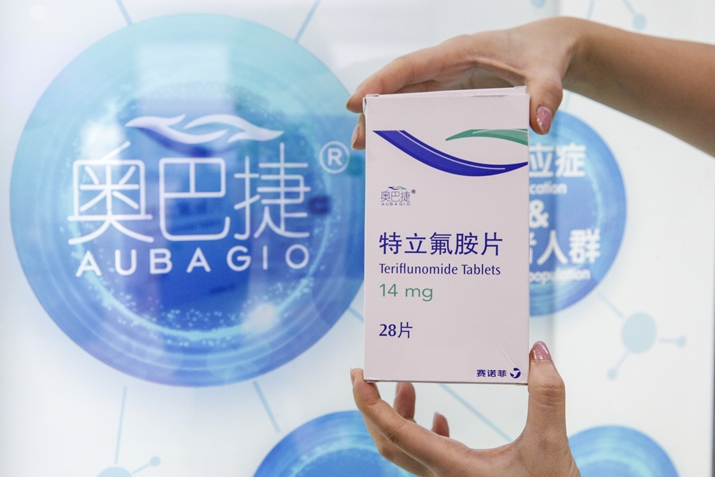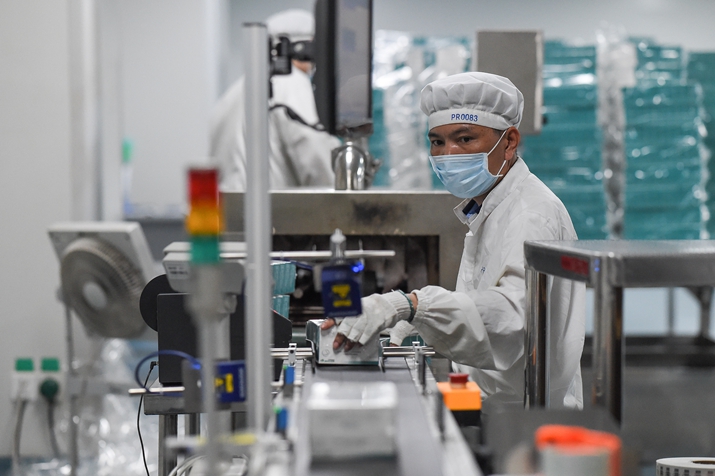The shortfall in the drug came about primarily because pharmaceutical companies had developed low motivation for producing it, owing to factors such as low profits and stricter environmental regulation.
One bottle of the drug, containing 100 tablets, was priced 1.48 yuan to 4.9 yuan ($0.2 to $0.76). Only 13 drug companies had obtained approval to produce the drug and only three companies had received the green light to produce the active pharmaceutical ingredient (API), the biologically active component in any medicinal product. Some companies had, over time, gradually ceased producing the drug. Of those three companies producing API, only Yanjing Pharmaceutical Co. in Beijing continued to make the tablets. However, the company halted all production of the thiamazole tablet API on March 2013 because its certificate for production had expired.
To address the shortage, the government extended the period of validity for the certificate and allowed the company to resume production.
To help the company restart the manufacturing process more swiftly, the Ministry of Industry and Information Technology (MIIT) and the Beijing Municipal Bureau of Economy and Information Technology provided subsidies for the company to carry out technological upgrades.
Yet the thiamazole tablets weren't the only drug in short supply. In early 2017, penicillamine tablets, a drug for treating Wilson's disease, a rare genetic disorder that causes excess copper to build up in various organs, came in short supply across China owing to a lack of raw materials. Family members of patients reached out for help on social media, which drew widespread attention to the problem.
Wilson's disease is progressive and if left untreated may cause liver disease, damage to the central nervous system, and eventually death.
Drugs like the thiamazole and penicillamine tablets are necessary for medical treatment, and saving lives even, but were often more likely to suffer shortage because of their thin profits and small market demand. As a result, many patients had to turn to more expensive imported drugs as alternatives.
"In the past, the supply of penicillamine tablets was unstable, causing patients much trouble," Zhang Ting, a doctor with the Children's Hospital of Shanghai, told Guangming Daily.
Today, the lack of these drugs has been addressed. Inside the production base of Sinepharm, a subsidiary of Shanghai Pharmaceuticals Holding Co. Ltd., also known as Shanghai Pharma, a production line has been established to ensure their sufficient supply.
"The medicines were in short supply, even running out of stock, because in the upper stream of the supply chain, the raw materials were not sufficient," Gu Haoliang, Vice President of Shanghai Pharma and Chairman of Sinepharm, told Guangming Daily.
To solve the problem, Sinepharm signed a contract with a pharmaceutical company in Jiangxi Province which subsequently invested 10 million yuan ($1.5 million) to develop an API manufacturing base back in 2017. The company also acquired additional API from abroad to solve the short-term shortage.

A drug for treating multiple sclerosis, a potentially disabling disease of the brain and spinal cord, with a wide range of potential symptoms, is on display at the first China International Import Expo in Shanghai on November 8, 2018 (XINHUA)
Government efforts
The drug shortage also caught the attention of the government. To establish a long-term mechanism guaranteeing sufficient and efficient
drug supply, four ministries, including the MIIT and the former China Food and Drug Administration, issued a joint guideline in 2018 on creating centralized production bases for undersupplied drugs.
The guideline read that around five pharmaceutical companies would be selected to take the lead in this initiative with government support.
The document further pointed out that scarce drug production bases are effective ways for guaranteeing ample supply. Moreover, it set the goal of achieving the centralized production and stable supply of 100 categories of scarce drugs by the end of 2020.
Yang Liu, an official with the MIIT, told Beijing Review on April 28 that the prearranged goal had already been achieved.
The companies involved in the construction of production bases rank among the top 100 pharmaceutical companies in China and all have official approval for producing over 20 categories of drugs in shortage.
In addition, the four ministries pledged to strengthen their policy support for centralized production bases for scarce drugs, such as giving priority to approval procedures for these drugs, and monitoring the supply and demand of scarce drugs to give early warning to pharmaceutical companies about shortages.
Social responsibility
"API is key to guaranteeing scarce drug supply," Gu said. "In recent years, as enforcement of environmental regulations has been stepped up, API companies are investing large sums of money in pollution treatment; the production of some small companies that fail to meet environmental standards is restricted or even suspended. Consequently, API supply faces a lot of pressure."
To date, six production bases for scarce drugs have been established across China. Companies leading the construction of such bases include state-owned pharmaceutical giant China National Pharmaceutical Group and Brilliant Pharmaceuticals in Chengdu, Sichuan Province.
"The companies involved in the initiative are mostly large companies. Scarce drugs account for only a small proportion of these companies' overall production. These companies make only minor profits from the production of scarce drugs," Gu said.
Many of the medications in shortage are the so-called orphan drugs, namely, drugs for rare diseases or conditions. Although the occurrence rate for rare diseases is fairly low in China, the country does have a huge population and there are over 20 million patients suffering from rare conditions, with many of them experiencing difficulties in finding the drugs they need.
In 2018, five ministries published a catalogue of the first batch of rare diseases, which covered 121 diseases.
Shanghai Pharma is a company with approval for producing the largest number of rare disease drugs in China: 17 drugs targeting 18 rare diseases.
"The supply of scarce drugs directly concerns people's livelihood and producing such drugs represents an enterprise's willingness to fulfill its social responsibilities," Gu continued.
He concluded that his company will continue to improve the supply of such drugs based on patients' needs as well as negotiate prices with the National Health Commission to reduce the financial burden placed on patients.
(Printed Edition Title: Life-Saving Drugs)















